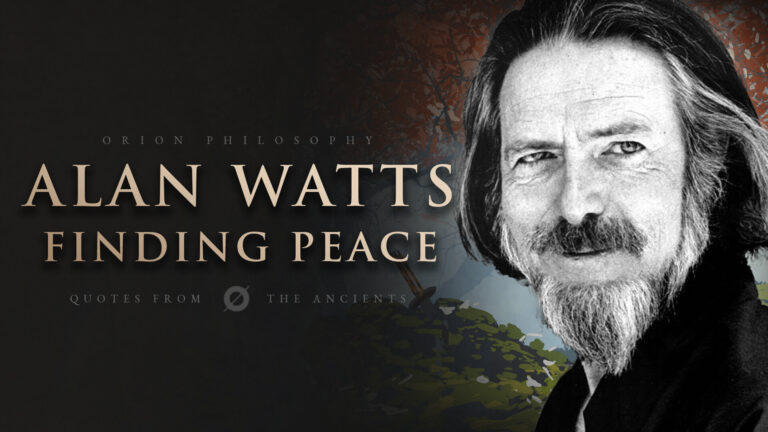Gaius Musonius Rufus was a Stoic philosopher from Rome living in the 1st century AD. Most known as the teacher of the famous Stoic Epictetus, Rufus taught philosophy under the rule of Emperor Nero, an Emperor who outlawed all philosophers for their free thinking and ideas he deemed a threat to his reign.
Rufus’ philosophy mirrored that of his student, Epictetus. A practical Stoic philosophy designed to help people find the best possible ways of living. His philosophy was also one that was meant for each individual to follow on a journey by themselves, to reflect and find their path to eudaimonia, or happiness.
This is a selection of his greatest quotes.
Musonius Rufus Quotes:
Choose to die well while you can; wait too long, and it might become impossible to do so.
If we were to measure what is good by how much pleasure it brings, nothing would be better than self-control if we were to measure what is to be avoided by its pain, nothing would be more painful than lack of self-control.
In our control is the most beautiful and important thing, the thing because of which even the god himself is happy— namely, the proper use of our impressions. We must concern ourselves absolutely with the things that are under our control and entrust the things not in our control to the universe.
If you accomplish something good with hard work, the labour passes quickly, but the good endures. If you do something shameful in pursuit of pleasure, the pleasure passes quickly, but the shame endures.
Being good is the same as being a philosopher. If you obey your father, you will follow the will of a man; if you choose the philosopher’s life, the will of the universe. It is plain, therefore, that your duty lies in the pursuit of philosophy.
For mankind, evil is injustice and cruelty and indifference to a neighbour’s trouble, while virtue is brotherly love and goodness and justice and beneficence and concern for the welfare of your neighbour.
For what does the man who accepts insult do that is wrong? It is the doer of wrong who puts themselves to shame-the sensible man wouldn’t go to the law, since he wouldn’t even consider that he had been insulted! Besides, to be annoyed or angered about such things would be petty-instead easily and silently bear what has happened, since this is appropriate for those whose purpose is to be noble-minded.
From good people you’ll learn good, but if you mingle with the bad you’ll destroy such soul as you had.
Generally speaking, if you devote yourself to the life of philosophy, whilst tilling the land at the same time, I couldn’t compare it to any other way of life, nor would I prefer any other livelihood.
Humanity must seek what is not simple and obvious using the simple and obvious.
In general, of all creatures on earth man alone resembles God and has the same virtues that He has, since we can imagine nothing even in the gods better than prudence, justice, courage, and temperance.
Therefore, as God, through the possession of these virtues, is unconquered by pleasure or greed, is superior to desire, envy, and jealousy; is high-minded, beneficent, and kindly (for such is our conception of God), so also man in the image of Him, when living in accord with nature, should be thought of as being like Him, and being like Him, being enviable, and being enviable, he would forthwith be happy, for we envy none but the happy.
Indeed it is not impossible for man to be such, for certainly when we encounter men whom we call godly and godlike, we do not have to imagine that these virtues came from elsewhere than from man’s own nature.
Since every man dies, it is better to die with distinction than to live long.
Since it so happens that the human being is not soul alone, nor body alone, but a kind of synthesis of the two, the person in training must take care of both, the better part, the soul, more zealously; as is fitting, but also of the other, if he shall not be found lacking in any part that constitutes man.
Thus it appears that exile helps, rather than hinders body and spirit, by treating them better than they treat themselves.
To accept injury without a spirit of savage resentment-to show ourselves merciful toward those who wrong us-being a source of good hope to them-is characteristic of a benevolent and civilized way of life.
To help us to cheerfully endure those hardships which we may expect to suffer because of virtue and goodness, it is useful to recall what hardships people will endure for immoral reasons.
Consider what lustful lovers undergo for the sake of evil desires-and how much exertion others expend for the sake of profit – how much suffering pursuing fame – bear in mind that they all submit to all kinds of toil and hardship voluntarily.
It’s monstrous that they endure such things for no honourable reward, yet for the sake of the good (not only the avoidance of evil that wrecks our lives-also the gain of virtue) we’re not ready to bear the slightest hardship.
To many people, even to most, despite living safely in their home city, fear of what seem to them the dire consequences of free speech is present.
The courageous, in exile or at home, is fearless in the face of all such threats; for that reason they’ve the courage to say what they think equally at home or in exile.”
Why do we criticize tyrants, when in fact we are much worse than they are? We have the same inclinations as they do; we just lack opportunities to act on them.
You will earn the respect of all if you begin by earning the respect of yourself. Don’t expect to encourage good deeds in people conscious of your own misdeeds.






